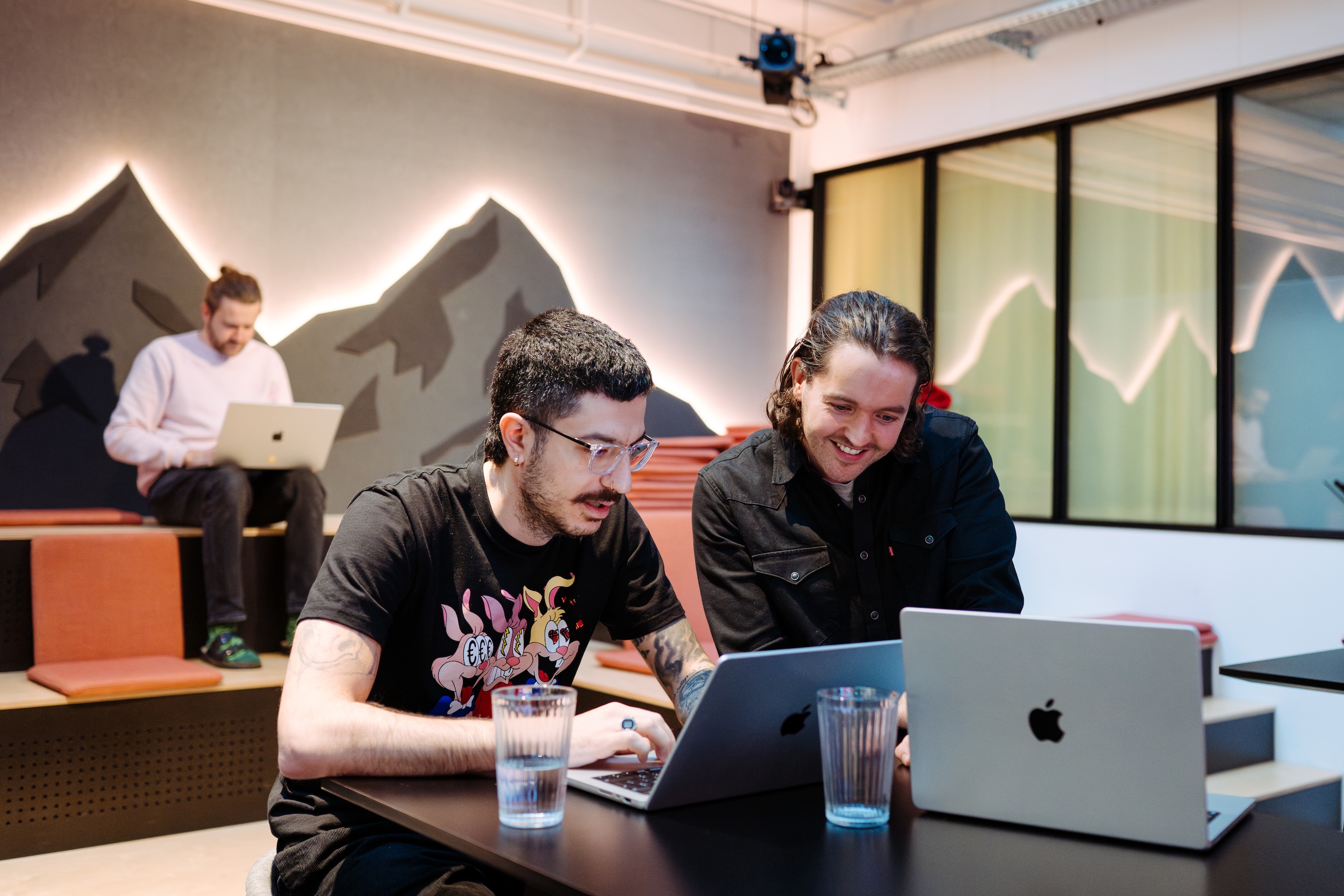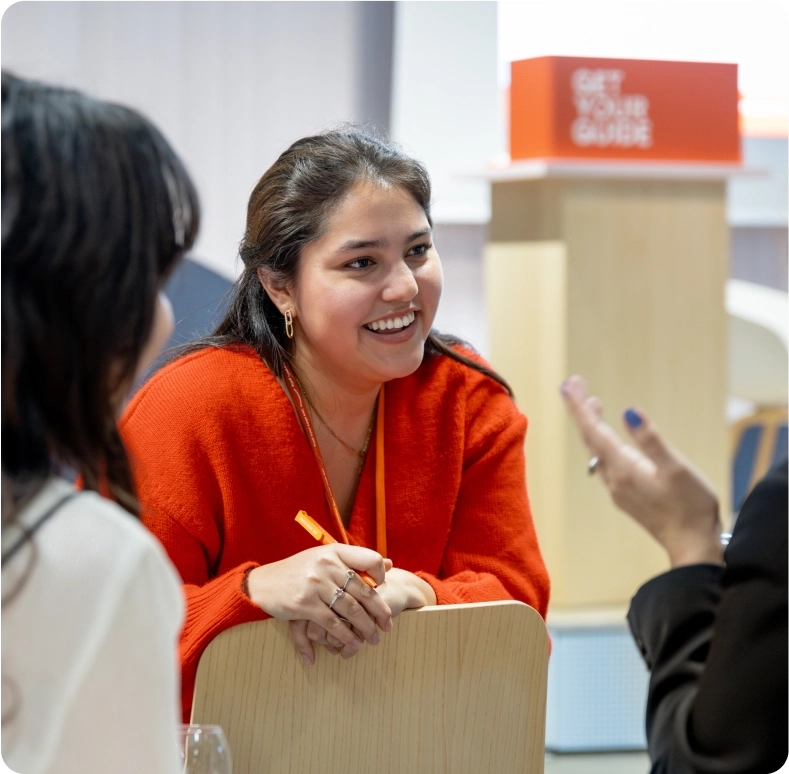Full-Stack Adventure: Navigating the Transition Path
Dive into GetYourGuide's innovative journey of transforming their tech team into versatile full-stack developers. This comprehensive blog post by Software Engineer Mazen Sadek reveals essential insights for navigating the transition from specialized roles to a more adaptable approach. Learn how to leverage team resources, embrace vulnerability, and maintain a holistic view of projects.

Key takeaways:
At GetYourGuide, we're excited to share our latest adventure: transforming our tech team into versatile full-stack developers. This strategic shift opens up new horizons for our engineers, enhancing our ability to innovate and deliver exceptional travel experiences. It also fosters a culture mindset of adaptability and versatility among our backend and frontend teams, urging every member to embrace the multifaceted role of a generalist. While this transition promised exciting avenues for skill enhancement and domain knowledge enrichment, it also ushered in a period of significant challenges and steep learning curves.
In this blog, Mazen Sadek, our Software Engineer, takes you behind the scenes of our journey, sharing the common pitfalls and the lessons we've learned, drawing insights from our own experiences along the way.
{{divider}}
The Temptation to Go It Alone
1. Recognizing the Limits of Individual Mastery
Transitioning to a full-stack engineer involves understanding that immediate mastery of every development aspect isn't necessary. When I first started working on the front end, I felt overwhelmed by the sheer volume of required knowledge. However, I soon realized it's more about adopting a relaxed approach to learning and implementation, acknowledging that expertise grows over time through experience and experimentation. This mindset shift promotes a more balanced journey in mastering the complexities of full-stack development, allowing for continuous growth and adaptation to new challenges.
2. Embracing Vulnerability and Seeking Assistance
Embracing the fear of asking for help is crucial for personal and professional growth. Reflecting on my journey, I recall moments when I hesitated to seek assistance, fearing it would reflect poorly on my abilities. However, I learned that seeking guidance from colleagues not only accelerates progress but also fosters a culture of collaboration and knowledge sharing. For example, when I encountered a particularly challenging bug in the code, I reached out to a more experienced colleague who not only helped me debug the issue and provided insights into best practices for error handling. Embracing vulnerability and leveraging the expertise of others enhances problem-solving and innovation while fostering team collaboration.
3. Utilizing Available Resources and Documentation
Utilizing existing internal documentation and resources is essential for overcoming obstacles and optimizing productivity while empowering individuals to tackle challenges more effectively. By leveraging resources such as internal wikis, documentation libraries, pull request comments, relevant Slack channels, and guild meetings, you can enhance your skills and contribute to the team's success. For example, when I need to familiarize myself with a new service or codebase, reaching out to the owning team, consulting their updated documentation, and asking for support and guidance significantly expedite the onboarding process.
Narrow Focus, Missed Opportunities
1. Getting Lost in the Code and Forgetting the Big Picture
It's easy to become immersed in the intricacies of coding and lose sight of a project's overarching goals and objectives. In my experience, there have been instances where I became deeply engrossed in the code, focusing solely on implementation details without considering the broader context. For example, I once obsessed over the colors or alignment of a section while neglecting the proper logic for the experiment displaying that section. This narrow focus can lead to inefficiencies and oversights, hindering progress and impacting project outcomes.
2. The Pitfalls of Tunnel Vision: Ignoring User Experience and Design
While focusing on coding tasks, tunnel vision can often neglect crucial aspects like user experience (UX) and design. Reflecting on past projects, I've realized the importance of considering UX and design in development. For example, while adding mute/unmute icons, switching between them might seem insignificant from an engineering perspective. However, ignoring these aspects can lead to suboptimal user interfaces, poor usability, and, ultimately, dissatisfied users. Incorporating UX and design considerations from the outset ensures that the final product effectively meets user needs and expectations.
3. Cultivating a Holistic Approach to Development
Taking a holistic view of a project is valuable, considering technical aspects, broader implications, and stakeholders' perspectives. For example, creating a project channel, holding proper kickoff meetings, and maintaining a backlog of agreements and disagreements with visible communications can significantly enhance project management. By breaking down projects into smaller, manageable tasks, prioritizing features based on user feedback, and adapting to changing requirements, teams can stay aligned with user needs and deliver value more effectively. This approach enables better decision-making, fosters collaboration and transparency, and ultimately provides more impactful and sustainable solutions, contributing to overall project and team success.
Balancing Depth and Breadth: Achieving Full-Stack Mastery
1. Recognizing the Value of Depth in Domain Knowledge
Achieving full-stack mastery involves more than just a broad understanding of various languages and frameworks; it requires deep expertise in specific domains. For example, mastering the intricacies of TypeScript or becoming an expert in Vue3 can provide a competitive advantage in tackling complex challenges and delivering high-quality solutions. By investing time and effort into mastering core concepts and technologies relevant to the field, developers can enhance their problem-solving abilities and contribute more effectively to projects.
2. Finding Opportunities to Specialize Within Full-Stack Development
Within the diverse landscape of full-stack development, there are numerous opportunities to specialize based on individual interests and strengths. For instance, focusing on mastering a language or diving deep into a particular framework can be as valuable as specializing in a niche area within the code. Owning that part with new insights, analysis, and refactoring can significantly enhance career development and member value within the team. By identifying and capitalizing on areas of interest, developers can carve out unique career paths and make valuable contributions to their teams and projects.
3. Continuing Education: Investing in Continuous Learning and Skill Development
Continuous learning and skill development are indispensable for maintaining full-stack mastery in a rapidly evolving tech landscape. Embracing a growth mindset and prioritizing ongoing education through online courses, workshops, and self-directed learning is essential for staying abreast of emerging technologies and industry trends. By investing in continuous education—possibly using a company's growth budget—developers can expand their skill sets, adapt to new technologies, and remain competitive in the ever-changing field of full-stack development.
4. Leveraging Tools to Optimize Development Processes
Optimizing development processes through using tools and frameworks is crucial for maximizing productivity and efficiency. For instance, tools like GitHub Copilot and ChatGPT can automate repetitive tasks, streamline workflows, and improve code quality, ultimately accelerating project delivery. Additionally, monitoring application performance with tools like Sentry and Datadog can help identify and address issues early on, ensuring smoother project execution and enhanced overall productivity. By incorporating these innovative tools into their development workflows, developers can streamline their processes and focus on delivering high-quality software solutions.
Conclusion: Embracing Growth and Collaboration
1. Embracing Mistakes: Catalysts for Transformation
Acknowledging mistakes and learning from them is essential for personal and professional growth. Reflecting on my journey, I've recognized that every mistake presents an opportunity for learning and improvement. By embracing a mindset of continuous improvement and resilience, I've turned setbacks into valuable lessons that have propelled me forward in my journey toward full-stack mastery.
2. The Power of Collaboration in Overcoming Challenges
Collaboration is a powerful tool for navigating challenges and achieving collective success. In my experience, I've seen how collaboration fosters creativity, innovation, and problem-solving. By working closely with teammates, leveraging diverse perspectives, and sharing knowledge and expertise, teams can overcome obstacles more effectively and deliver better outcomes. Embracing collaboration enhances individual growth, strengthens team dynamics, and fosters a culture of trust and camaraderie.
3. Looking Ahead: Embracing the Journey Towards Full-Stack Mastery and Beyond
As I look ahead, I am excited to continue my journey toward full-stack mastery and beyond. Reflecting on the progress I've made and the lessons I've learned, I am eager to embrace new challenges, expand my skill set, and deepen my expertise. Whether it's mastering new technologies, exploring innovative approaches to software development, or mentoring others on their journey, I am committed to lifelong learning and growth. With determination, perseverance, and a spirit of curiosity, I am confident in my ability to navigate the ever-evolving landscape of full-stack development and contribute meaningfully to the field.




.JPG)
.JPG)

